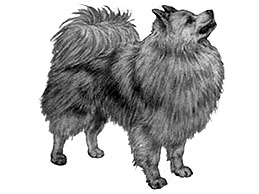German Spitz (Mittel & Klein)
Last updated: 22 Feb 2017
A breed standard is the guideline which describes the ideal characteristics, temperament, and appearance of a breed and ensures that the breed is fit for function with soundness essential. Breeders and judges should at all times be mindful of features which could be detrimental in any way to the health, welfare or soundness of this breed.

Kennel Club, London
Revised by the Kennel Club in August and December 1995
Revised Standard effective in Australia 1 January 1997
-
Group:
Group 7 (Non Sporting)
-
History:
-
General Appearance:
Compact, short coupled and well knit with an almost square outline. Firm condition, the profuse coat not disguising any lack of substance.
-
Characteristics:
The German Spitz is intelligent, active and alert. Its buoyancy, independence and devotion to the family are the breed characteristics.
-
Temperament:
Happy, equable disposition, showing confidence, with no sign of nervousness or aggression.
-
Head And Skull:
Medium large, broad and nearly flat skull when viewed from above and narrowing in a wedge shape to the nose. Stop moderately defined; muzzle approximately half length of head. Cheeks clean. Flews tight, no trace of lippiness.
Nose: Black in black, white, black/white parti-colours, black/tan bi-colours. Self colour as compatible with coat colour in other colour varieties. Never parti-colour or pink.
-
Eyes:
Medium size, oval shaped and obliquely set. Not too wide apart. Always dark with black rims in blacks, whites black/white parti-colours, black/tan bi-colours. As dark as compatible with coat colour in other colour varieties.
-
Ears:
Small, triangular and set rather high. Perfectly erect.
-
Mouth:
A perfect, regular and complete scissor bite, i.e. upper teeth closely overlapping the lower teeth and set square to the jaws. Black lips in black, white, black/white in parti-colours, black/tan bi-colours. Colour as compatible with coat colour in other colour varieties.
-
Neck:
Clean, moderately short and well set into the shoulders.
-
Forequarters:
Moderately sloping shoulder; upper arm of sufficient length to ensure elbow is vertically below point of withers. Moderate forechest. Elbows equidistant between ground and withers, turning neither in nor out. Well-boned, straight legs. Pasterns strong and flexible.
-
Body:
Length from point of shoulder to point of buttock equal to height at withers; short, well-developed loin. Moderate tuck-up. Well ribbed-up and rounded. Distance from brisket to ground not less than half the height from ground to withers. Top-line level.
-
Hindquarters:
Moderate angulation with hocks moderately well let down. Neither cow hocked nor wide behind.
-
Feet:
Small, rounded, cat like, with well arched toes.
-
Tail:
High set, curled right up from root, lying curled over back.
-
Gait/Movement:
Moving without exaggeration from any angle. Straight coming and going. Viewed from side, effortless, brisk action, retaining topline.
-
Coat:
Double coat consisting of a soft woolly undercoat and a long harsh textured perfectly straight top coat covering the whole of the body. Abundant around neck and forequarters with a frill of profuse, but not excessive, off standing straight hair extending over the shoulders. Forelimbs well feathered tapering from elbows to pasterns. Hind limbs feathered to hocks. Ears covered with soft short hair, Hair on the face smooth and short. Tail profusely covered with long spreading hair. This is not a trimmed breed and evidence of trimming and shaping, other than tidying of the feet, anal area and the legs below the hocks, unacceptable.
-
Colour:
All colour varieties and markings acceptable, with the exception of merle. Butterfly pigment not permitted with any colour.
-
Sizes:
Height: Klein 23-29cms (9-11.5 ins)
Mittel 30-38cms (12-15 ins)
Dogs masculine, bitches feminine.
-
Faults:
Any departure from the foregoing points should be considered a fault and the seriousness with which the fault should be regarded should be in exact proportion to its degree and its effect upon the health and welfare of the dog.
-
Notes:
Male animals should have two apparently normal testicles fully descended into the scrotum.
 For owners
For owners
 Members
Members
 Dogs Australia is a not-for-profit organisation advocating for the preservation of purebred dogs through ethical breeding.
It champions the highest standard of animal welfare through education and fostering dog-loving communities.
Internationally recognised and established in 1958 as the Australian National Kennel Council (ANKC),
the organisation promotes responsible dog ownership; maintains the ORCHID* heritable canine diseases database;
funds research into canine diseases; and supports state and territory-based member bodies.
Dogs Australia promotes breed conformation shows and community sports for dogs that fulfil a breed’s natural instincts.
Dogs Australia is a not-for-profit organisation advocating for the preservation of purebred dogs through ethical breeding.
It champions the highest standard of animal welfare through education and fostering dog-loving communities.
Internationally recognised and established in 1958 as the Australian National Kennel Council (ANKC),
the organisation promotes responsible dog ownership; maintains the ORCHID* heritable canine diseases database;
funds research into canine diseases; and supports state and territory-based member bodies.
Dogs Australia promotes breed conformation shows and community sports for dogs that fulfil a breed’s natural instincts.







